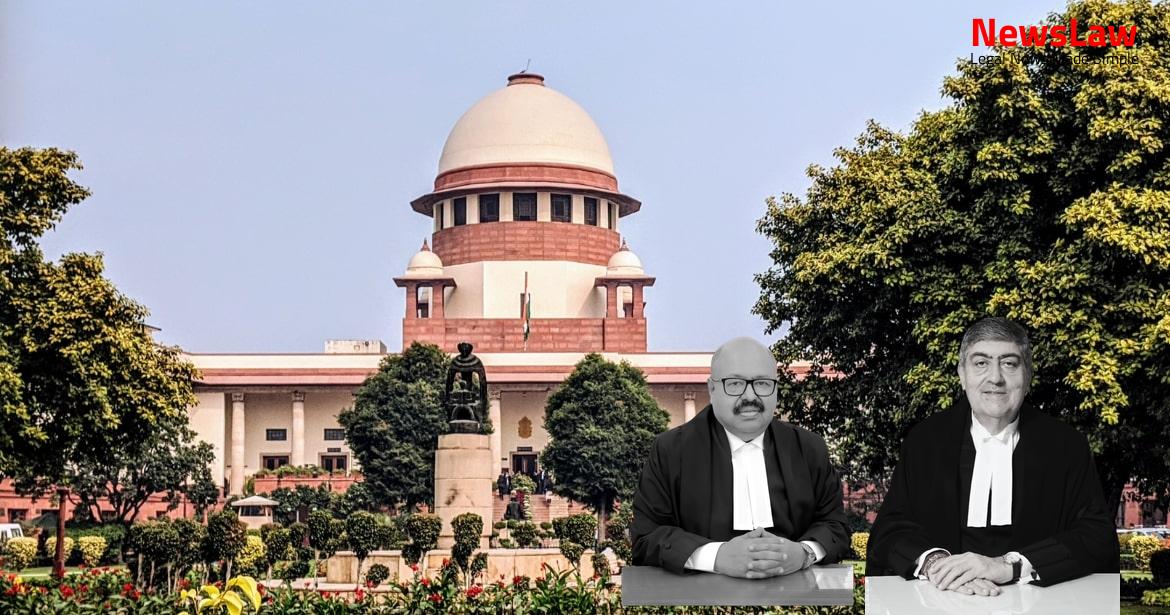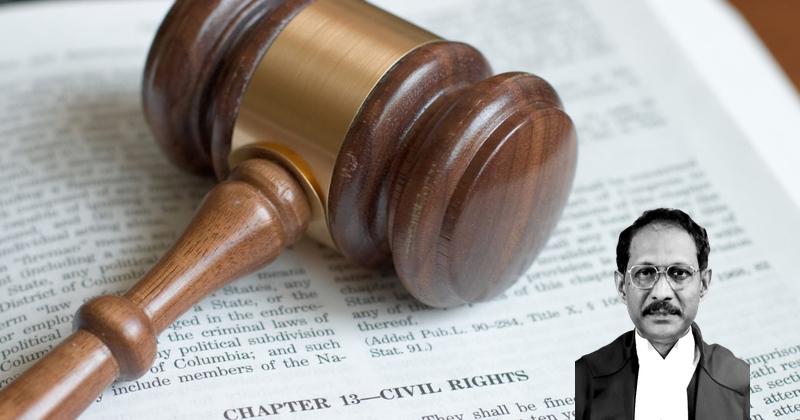This case delves deep into the legal landscape surrounding mining lease renewals and refunds, focusing on the court’s elaborate legal analysis. The complexities of the issue are unraveled through a thorough examination of statutory provisions, judicial opinions, and past precedents. Stay tuned to unravel the nuances of the legal framework governing mining leases and the implications for parties involved.
Facts
- The State of UP decided that the land in question belongs to the Revenue Department.
- The mining operations were to be conducted on this land.
- An application for renewal of mining leases was considered and the order dated 31.5.2003 was set aside.
- An SLP against this order was dismissed by the Court on 22.11.2018.
- The exclusion of the subject land from the purview of Section 4 of the Forest Act reached finality.
- The events of 1992 involved the Uttar Pradesh State Cement Corporation becoming a sick industry and being auctioned, with M/s Jayprakash Associates Limited emerging as the highest bidders.
- The High Court directed the rejection of prayers for consideration of pending applications for renewal of mining leases and grant of fresh leases under Chapter II of the Mining Rules.
Also Read: Supreme Court Judgment on Single Till Mechanism for HRAB Calculation: A Comprehensive Analysis
Arguments
- Plea advanced that the State Government itself was not satisfied with the impugned order
- Additional plea advanced regarding the G.O. dated 31.5.2012 not being applicable
- Calculation of compensation filed by the appellants in case leases are not renewed
- Losses stated to include idling of machinery, infrastructure, payment of salaries, staff accommodation costs, and litigation costs
- Appeal dismissed as withdrawn on 29.9.2020
- Instruction to withdraw appeal given by learned senior counsel Mr. V. Shekhar stating that the State Government was not desirous of pursuing the appeal
- The appellants argue that the suspension of the mining leases was not due to any fault on their part, as there was no illegal mining or any other factor against them.
- They base their contentions on previous litigation rounds where they had succeeded, highlighting that the consequences of Section 4 notification had already been settled.
- The appellants claim that their settlement proceedings were ignored in the impugned order without notice to them, and the Mining Rules do not provide for damages in case of disruption of mining leases.
- It is argued that the G.O. dated 31.5.2012 and subsequent notifications have no impact on their leases, as clarified by judicial precedents.
- The delay in issuance of the Section 20 notification is attributed to the State’s apprehension of violating past orders.
- The appellants seek refund of lease amounts for the disrupted period, as they were not entitled to extension or renewal of their leases.
- The State is only liable to refund security deposits or advance royalties under the circumstances.
- The AIKPF supports the State’s contention regarding the prohibition of mining in ESZ declared around the Kaimur National Park and the consequences of mining activity.
- The Supreme Court’s observations regarding the definition of ‘minor mineral’ are cited to argue against the sustainability of lease extensions without specific provisions in the Mining Rules.
- The plea of the State for non-grant of extension of leases is claimed to be contrary to past instances where such power was exercised under Rule 68 of the Mining Rules.
Analysis
- The State of UP issued a New Mining Policy on 12.6.2017, which did not have provision for extension of time for obstructed period of mining lease.
- NGT directed the State of UP to cancel all leases under Section 4 areas after issuing an order on 4.5.2016 in T.N. Godavarman Thirumalpad v. Union of India case.
- The issue to be determined by the Court was whether the leases are liable to be renewed for the obstructed time period or refund of the lease amount for the non-operational period.
- Leaseholders were not made parties in the proceedings, causing them to suffer consequences of the orders.
- Two lines of legal developments were traced, originating from the Notification under Section 4 of the Forest Act.
- The notification under Section 20 of the Forest Act was crucial in this matter.
- The State of UP contended that they were only liable to refund the security deposit or advance royalties for the obstructed period.
- The Court emphasized that the right to an extension of lease must flow from a statutory provision or lease terms.
- Judicial opinions established that mere application for grant or renewal of leases does not confer vested rights.
- The State of UP had to perform its statutory duty of issuing the notification under Section 20 of the Forest Act, which was finally done on 15.6.2020.
- The mining activity had been stopped due to various legal proceedings and orders, leading to a ban in certain areas.
- The State of UP was willing to refund the proportionate lease amount for the non-operational period of the leases.
- The Mining Rules and statutory provisions guided the decision-making process in extending or renewing leases.
- An Eco-Sensitive Zone was declared in the area, affecting mining operations.
- The NGT issued orders for prohibition of illegal mining activities around the Kaimur Wildlife Sanctuary, leading to a series of legal proceedings and interventions.
- The Court had to navigate through previous litigation, statutory provisions, and judicial opinions to reach a decision regarding the extension or refund of mining leases.
- The Court was cautious not to infringe on statutory provisions and highlighted the importance of upholding legislative intent.
- The State of UP provided factual positions regarding lease grants in affidavits and submissions during the legal proceedings.
- The State Government has the power to appoint officers to perform duties of a Forest Settlement-officer under the Forest Act.
- Notification under Section 4 specifies the limits of reserved forest area.
- State admitted active leases in reserved forest areas without corresponding notification under Section 20 of the Forest Act.
- Section 20 outlines the process for declaring a forest reserved after certain events have occurred.
- Failure to issue a notification under Section 20 means that the area falling in reserved forest under Section 4 did not follow the required process.
- Section 4 of the Forest Act allows the State Government to constitute land as a reserved forest.
- Rule 68 of the Mining Rules allows the State to extend leases for obstructed periods, as noted by the Apex Court and reiterated by the High Court.
- Leaseholders cannot excavate minerals based on lease deeds or permissions granted after a specific date under the guise of renewal or extension.
- Judicial interdicts causing obstructed periods do not justify lease extensions without following statutory provisions.
- The Allahabad High Court upheld this view in the Vijay Kumar Dwivedi case, where mining activities were obstructed during lease periods.
- G.O. dated 31.05.2012 affects pending lease applications and lease renewals as established in Nar Narain Mishra v. The State of UP and Ors.
- The Supreme Court endorsed this interpretation in Sulekhan Singh & Company and Ors. V. State of Uttar Pradesh & Ors.
- Rule 68 does not authorize the State to extend leases beyond contracted periods without abiding by the procedures outlined in the Mining Rules.
- The rule cannot be used to compensate leaseholders for losses due to termination or curtailment of their lease by the competent authority.
- In Vijay Kumar Dwivedi v. State of Uttar Pradesh, the validity of permissions granted to leaseholders for obstructed periods was under scrutiny.
- Contextual consideration is necessary when discussing the interdict and the preservation of the forest area.
- Even with the State of UP’s notification and DMs authorization, the transparent policy of 2017 favors not extending leases for obstructed periods.
- Security deposits that have not been refunded should carry simple interest at 9% per annum.
- The appropriate action is not to extend leases for obstructed periods but to refund security deposits and advance royalties to the leaseholders.
- Additional measures are justified under Article 142 of the Constitution to ensure complete justice considering the prolonged blocking of funds and mining prevention.
- Balance is needed between the parties’ situation of blocked funds and the lack of provision for lease extensions in statutory or contractual terms.
Also Read: Selection and Appointment of Judicial Officers in Himachal Pradesh
Decision
- State of UP’s review dismissed on 29.8.2018
- Advance royalties for obstructed period to carry 9% interest from 29.8.2018 and 5.2.2019 till date of payment
- Appellants to be refunded security deposit with 9% interest if not already refunded after lease expiry
- Appellants to be refunded advance royalties with 9% interest from obstruction date till payment
- Amounts to be refunded within two months from today
- Limited directions given, contradictory observations in impugned order set aside
Case Title: DHARMENDRA KUMAR SINGH Vs. THE STATE OF UTTAR PRADESH (2020 INSC 614)
Case Number: C.A. No.-012202 / 2018



